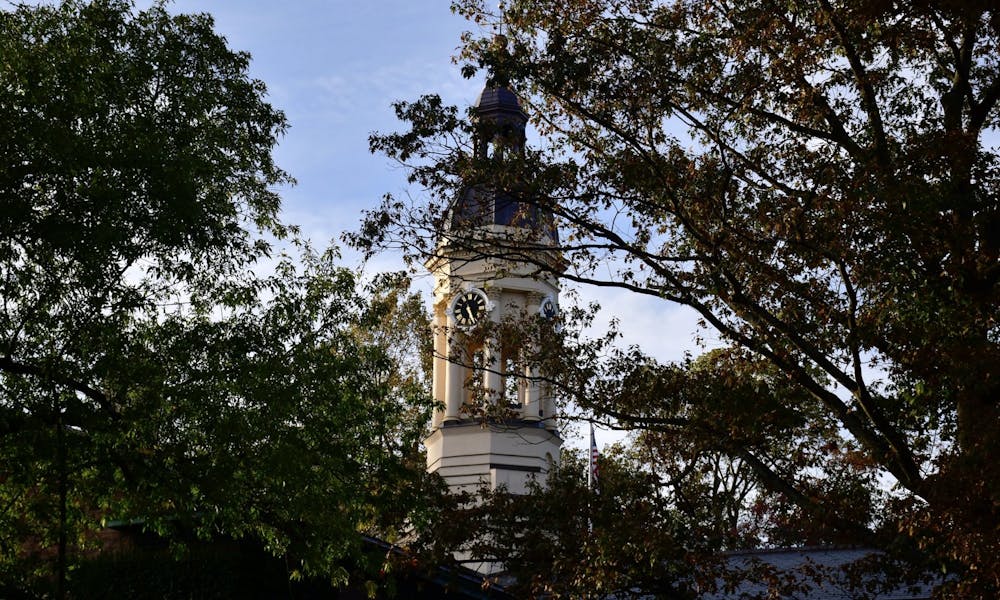The University proclaims “a longstanding commitment to service, reflected in Princeton’s informal motto — Princeton in the nation’s service and the service of humanity — and exemplified by the extraordinary contributions that Princetonians make to society.” Yet, for most students, classes and meetings will run on the normal schedule during Election Day, rendering democratic participation difficult, if not impossible.
If students are to exemplify their service to the nation, the University should suspend classes on Election Day. Doing so would encourage voting and working at the polls and model political participation for other universities and institutions across the country.
Deciding who represents you in government lies at our society’s bedrock. Although the election system in place today prevents many people who should be eligible to cast their votes from voting, elections are the basis of U.S. democracy. Participating still offers the best chance for us as a society to make change.
Changing how we approach Election Day would not be new: In fact, our system of voting has evolved since the founding of the country. Until 1845, election dates, even for national office, were set in individual states within a 34-day period of each other.
The states, however, found that the results of voting days earlier in the schedule were likely to sway support, and thus concluded that setting all voting for the same day would give voters more equal say. Deciding to designate Tuesday as the election day originated from the idea that people would need a day to travel to the polls, and since church services were on Sundays and the market days were on Wednesdays, Tuesdays seemed like the logical day. Elections occurred in November because it was still warm enough to travel in most parts of the country, but the fall harvest had concluded.
Even though much of the country has shifted away from needing to schedule voting around these particular concerns, we’ve kept voting on Tuesdays in November. Many people do not think that Election Day should be held on a single day; others think that Election Day should be a national holiday, or that we should vote on a weekend.
These steps would grant most people the time to vote, as jobs and other obligations that prevent taking extra time on Tuesdays to vote discriminate against minority and working-class citizens. For the time being, however, no national holiday appears on the horizon.
While the status of Election Day as a national holiday remains contested, Princeton can promote voting within its own community. The University has already put resources towards voting rights, creating the Vote100 initiative with a clear mission statement for civic engagement: “Our goal is to continue to highlight the critical importance of electoral participation as an essential aspect of a vibrant democracy; we want all members of our community to pledge to participate in all future elections, showing that civic responsibility is a foundational characteristic of what it means to be a Princetonian.”

Granting Election Day off would allow Princetonians to engage civically. This year, poll workers are direly needed, and Princeton students could rise to the occasion. For students who live abroad, there are even remote poll observation and exit interview opportunities available.
Jobs at polling stations are largely run by senior citizens and other retired people, as it is difficult to find people willing and able to skip work on a Tuesday. COVID-19, however, has sidelined many immunocompromised and older people, leaving many polling locations in a bind. They need more poll workers, but most people who would be capable of working safely are unable to do so because of other commitments.
Members of the campus community can help: Laura Wooten, a University staff member, preached the importance of voting, and worked as a poll worker from 1939 until her passing in 2019 — one of the longest serving poll workers in U.S. history.
Naturally, not everyone can work at the polls, but holding classes precludes many from even considering the possibility.

This year, safely do what you can to protect our democracy. If you are running meetings or teaching classes, be considerate of the people who are joining the national effort to keep our elections fair, and consider changing meeting and class dates or times.
I’m on the 6 a.m. shift at my local polling station. I’m sure there are less painful ways to engage, but I hope I’m doing my part to make the election run smoothly. I encourage everyone who is eligible to vote to practice our human right, and to do whatever else you are capable of, whether it’s working the early shift or something else altogether.
By canceling classes on Election Day, the University can show that it agrees.
Mohan Setty-Charity is a first-year from Amherst, Mass. He can be reached at ms99@princeton.edu.








